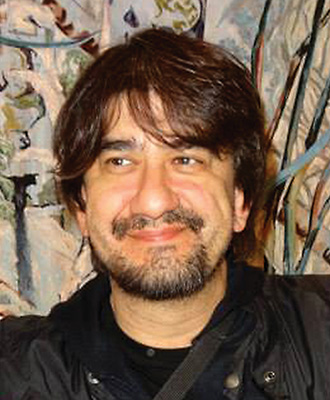
キオ・グリフィス
Kio Griffith
越境 / ケーススタディ / 音
作家でありキュレーターである観念から感じられるこれから起動し始めるグローカル仮説に基づいた世界観の考察、自己地域の限界枠で活動の試みを展開する様々なプラットフォームを持つクリエーター、アーツ•コミュニティー、オルタナティブ•スペース、ポップアップ、などの紹介や海外情報をメインに,『Bridge』という言葉について、想像することの楽しさを伝えたい。例えば人間、植物、昆虫、鉱物などを音と考えると、世界は音に満ちている。それらの仲立ちとなり、流動的な音同士をつなげて、大小の美しい音楽=橋を創造する自分が幸せだと思う。
「行き来」もまた橋に近い意味を持つ。アメリカ人の父と日本人の母との間に生まれ、今でも両方の国で暮らす自分にとって、正直その行き来の経験は、楽しいことばかりではなかったとも言える。自分はどこにいても、たとえ家があったとしても「外国人」らしい。一昨年から始めた「珊瑚海」のシリーズは、父方母方の家族同士が実際第一次大戦中に戦った背景を作品にしたものである。
日々の「行き来」の道すがら、世上の雑事に隠れる新しい何かとの出会いに、如何に喜び、おどろき、感動したかを伝える『Bridge Story』にしていきたい。
「行き来」もまた橋に近い意味を持つ。アメリカ人の父と日本人の母との間に生まれ、今でも両方の国で暮らす自分にとって、正直その行き来の経験は、楽しいことばかりではなかったとも言える。自分はどこにいても、たとえ家があったとしても「外国人」らしい。一昨年から始めた「珊瑚海」のシリーズは、父方母方の家族同士が実際第一次大戦中に戦った背景を作品にしたものである。
日々の「行き来」の道すがら、世上の雑事に隠れる新しい何かとの出会いに、如何に喜び、おどろき、感動したかを伝える『Bridge Story』にしていきたい。
01 文聞録~其の一
Warning: Use of undefined constant - assumed ' ' (this will throw an Error in a future version of PHP) in /home/users/2/abi0707/web/a-b-i.info/wp/wp-content/themes/abi/single-story.php on line 49
人の声を録るとき、最も気になるのは自分が放つ音である。同じように、自分が話すと同時に語りかけてくる相手のしぐさや吐息が、空間内で形になるところであったりする。息を殺しながら録音マイクの拾う音は、その多くの模様のクラスターを変容しつつ、声の主の肖像を幾度も描き変えるように聞こえてくる。
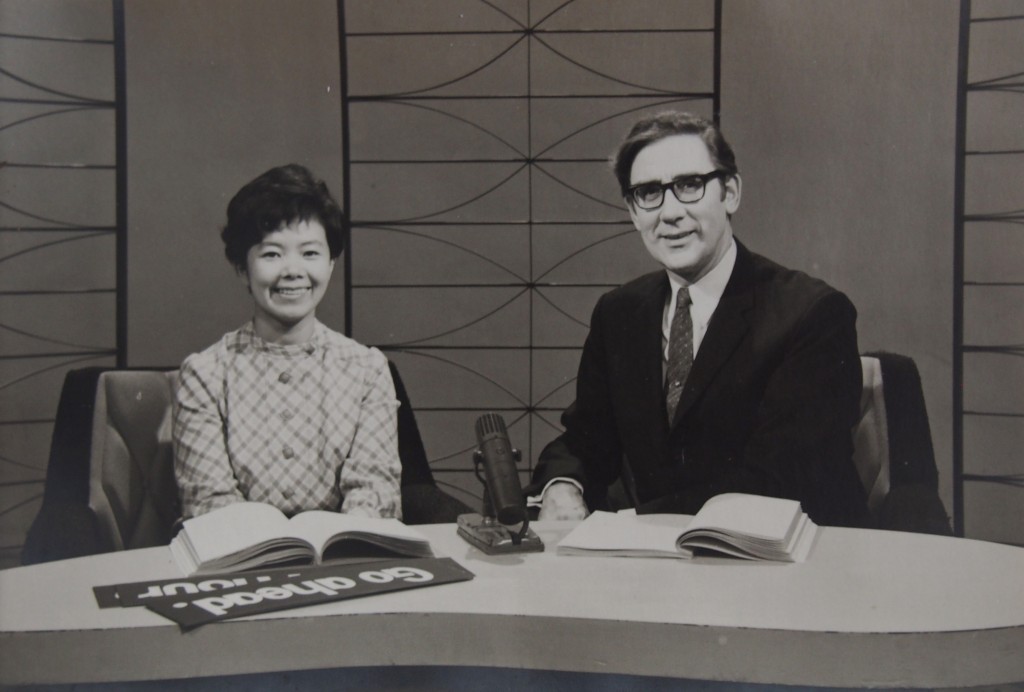
8年前に他界した父には、多くの日課がありました。そのうちの一つは、朝早い時間にアリアを歌い、それから入念に棚の前を左へ右へ「今日のレコード」を選 び、まるで儀式であるかのようにレコードを回転盤の上 であたためます。そして針を落とす前にじっくり盤面の ツヤを確認しながら、まだはっきり瞼が開かない私にこ れから流す音の解説をしてくれました。タイトルや作曲 家の名前は覚えられませんでしたが、不思議なことに音源は しっかりと耳から入り、体のどこかへ録音されたように 残るものでした。父の夜の過ごし方は食後の読書、それと58年間欠かさ なかった日記。これは今回の『あいちトリエンナーレ』 で知り合ったジェリー•グレッツィンガーの53年間描き続けてきた一生涯の作品からも感じたことですが、ア メリカの古い世代の人の良さは、一つのことを忠実に、 そして誠実に追求する情熱です。日記をつけるためのノートとペン、絵を描くための紙と絵の具。それに比べて恵まれたガジェットを無数に持ち、組み合わせの操作をしながら、なおかつ時間に管理され生きる私には、彼らの行為は己の時間軸を持ってこそ発現できる姿勢のように思えます。文を読解して、文を書き残す父の姿は寺の僧のようでした。
「お母さんがリビングルームの壁を全面濃い赤に塗り、 友達にクレージーと言われたことがある。私は不思議とにその色に愛着を感じるようになった。初恋の色は それかな。」これは今回あいちトリエンナーレで私が発表した新作『white house』で、声の出演をお願いした ジェリー•グレッツィンガーが語った、初恋の色にまつ わる話の会話の一部です。この作品は日本中を旅するなかで出会った人々や、芸術祭に参加中の作家 とそれをサポートするスタッフたちの生の声を集めて、その中で関連した音色、言語、方言、想いを探り、一つの合唱の形にした作品です。収録した声の多くはクラシックな文学作品から引用した、短い映像のカットを思い起こすような一節でした。
「お母さんがリビングルームの壁を全面濃い赤に塗り、 友達にクレージーと言われたことがある。私は不思議とにその色に愛着を感じるようになった。初恋の色は それかな。」これは今回あいちトリエンナーレで私が発表した新作『white house』で、声の出演をお願いした ジェリー•グレッツィンガーが語った、初恋の色にまつ わる話の会話の一部です。この作品は日本中を旅するなかで出会った人々や、芸術祭に参加中の作家 とそれをサポートするスタッフたちの生の声を集めて、その中で関連した音色、言語、方言、想いを探り、一つの合唱の形にした作品です。収録した声の多くはクラシックな文学作品から引用した、短い映像のカットを思い起こすような一節でした。
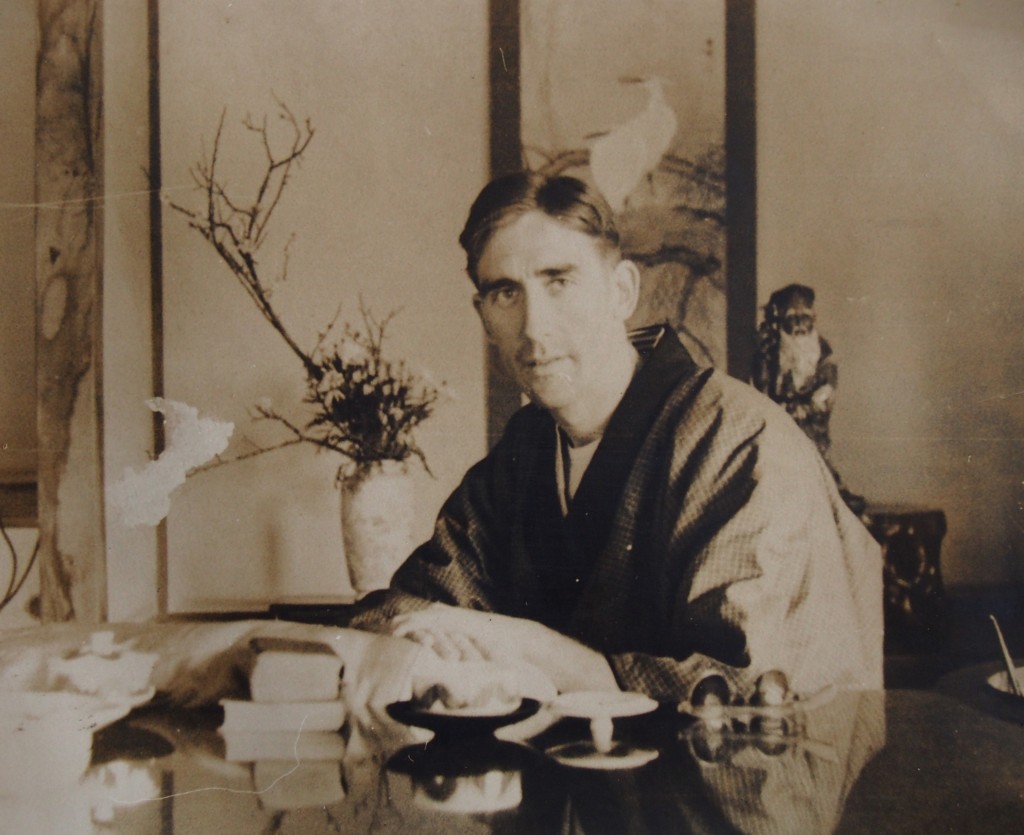
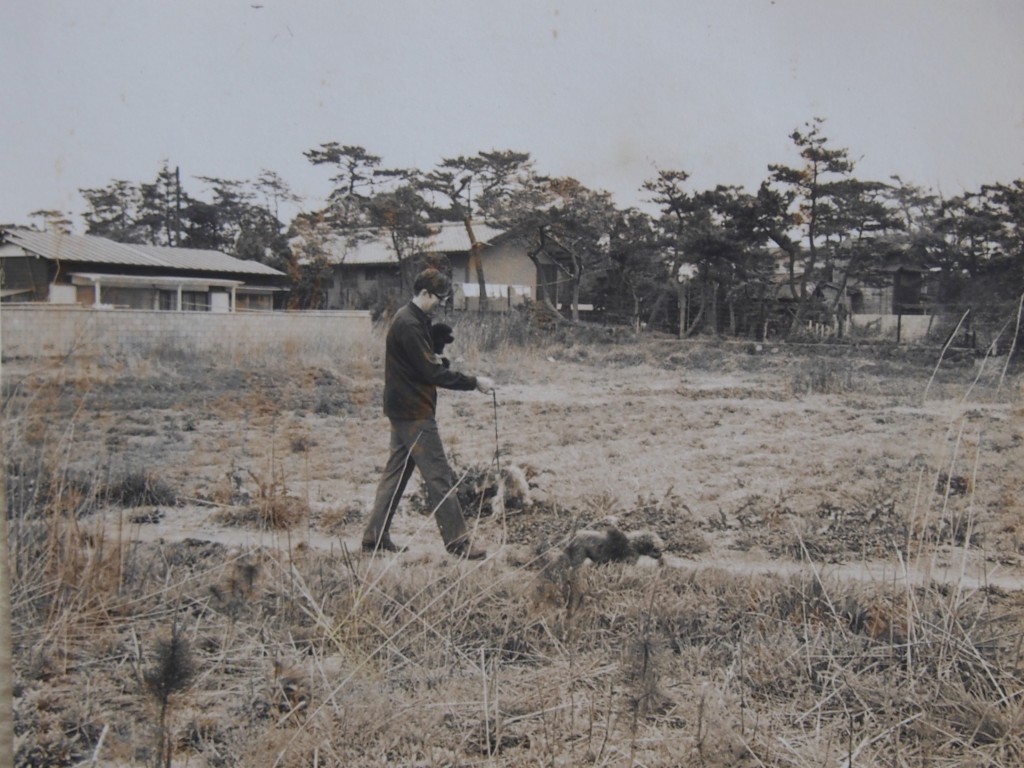
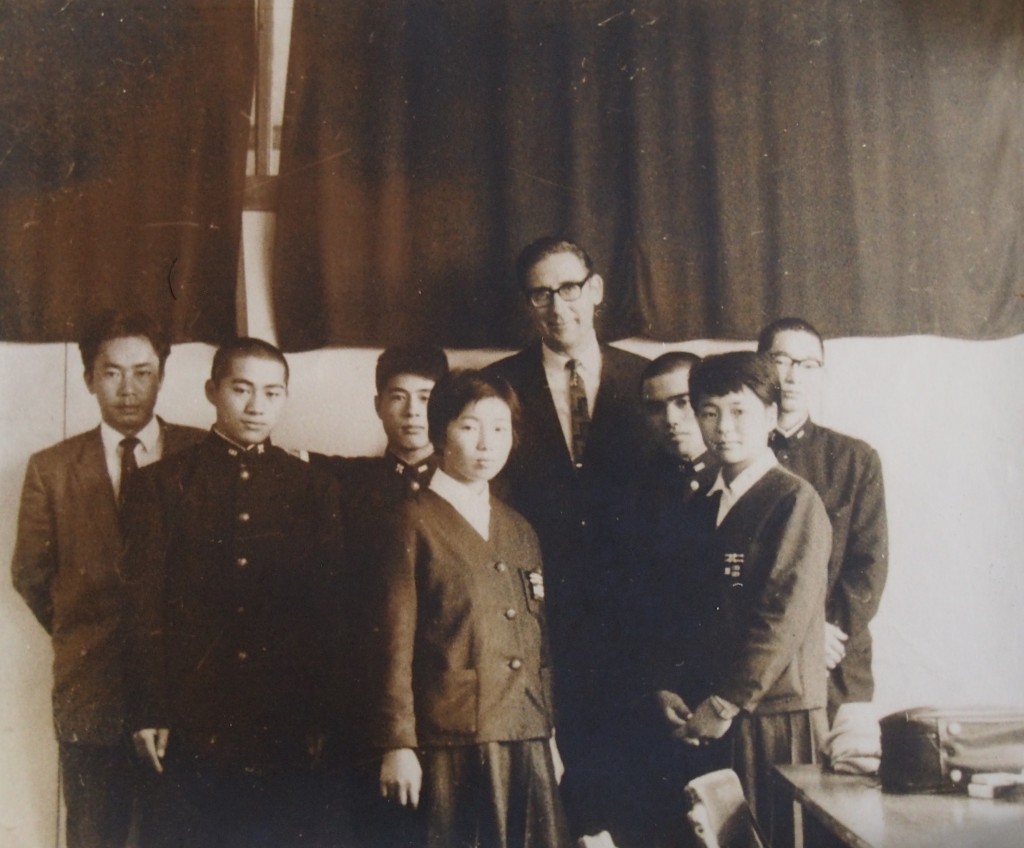
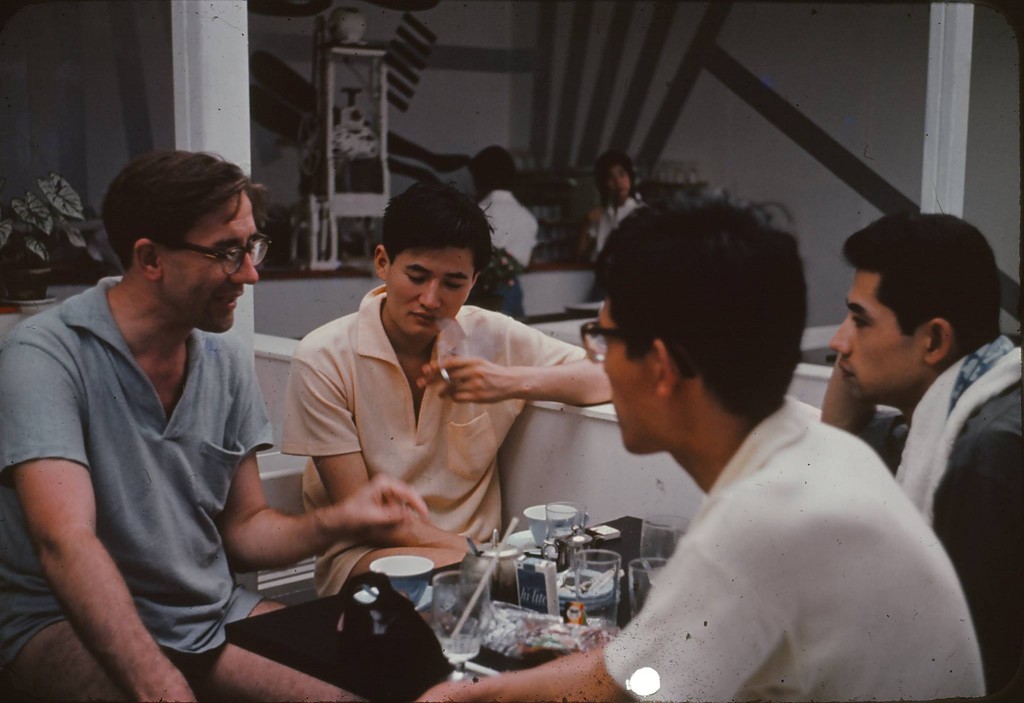
父は青山学院大学文学部の教授でしたが、その他にブリヂストンタイヤで翻訳家兼 コピーライター、NHKでは英会話番組、ラジオドラマにも出演するなど活動範囲の広い人でした。幼少期の私は一度、彼の番組の子役でリハーサルに連れて行かれたことがありますが、その時に私が感じた人前に出る恐怖は想像以上、妄想増幅状態でした。最後には放心おもら しで、さぞかし父の印象を悪くしたことでしょう。今の私とは思えないくらい、幼い自分は人の群れを避け、森林の中でうずくまり、虫の声をぼーっと聴くのが好きな 子供でした。虫の声は地面の枯葉を鳴らし、風は笛のように奏でながら大木の枝の間を抜けて、それらを覆うように大空に満ちる灼熱の太陽がジリジリと音で接近して いました。
「愚かな理屈は必須だ。」は、父からもらったアドバイス。苗字のGriffith (グリフィス 愚理必須)の漢字の読み仮名から、当時、学習院大学で教鞭をとっていたレジナルド・ブライス先生と一緒に作った言葉でした。譲り受けられなかったのは声楽で、私はひどい音痴です。カラオケも極力避けて現在に至ります。弟が父の鏡のように育って声楽、ピアノ、クラシックギターと正当な才能を発揮する中、私は難民のように ロック、ジャズ、実験音楽、現代美術の界隈を彷徨い、 中学から大学卒業までは父親との接点を失っていました。その放浪の間に、自分と同じように屈折して掻き分けるように生きる目的を探している作家たちと出会い、 音楽のオルターナティブな形を体験することになり、初めてフルクサス系のパフォーマンスでボーカルを託されたときはもう深海に飛び込む勢いでした。「声のちから」を再発見したのはこの頃です。
「愚かな理屈は必須だ。」は、父からもらったアドバイス。苗字のGriffith (グリフィス 愚理必須)の漢字の読み仮名から、当時、学習院大学で教鞭をとっていたレジナルド・ブライス先生と一緒に作った言葉でした。譲り受けられなかったのは声楽で、私はひどい音痴です。カラオケも極力避けて現在に至ります。弟が父の鏡のように育って声楽、ピアノ、クラシックギターと正当な才能を発揮する中、私は難民のように ロック、ジャズ、実験音楽、現代美術の界隈を彷徨い、 中学から大学卒業までは父親との接点を失っていました。その放浪の間に、自分と同じように屈折して掻き分けるように生きる目的を探している作家たちと出会い、 音楽のオルターナティブな形を体験することになり、初めてフルクサス系のパフォーマンスでボーカルを託されたときはもう深海に飛び込む勢いでした。「声のちから」を再発見したのはこの頃です。
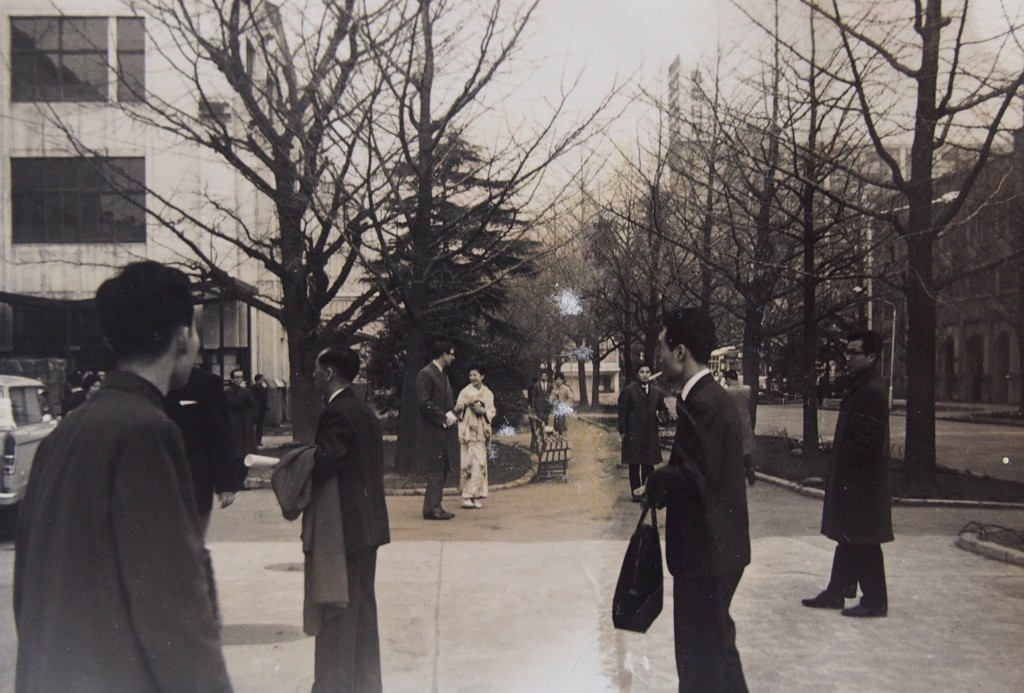
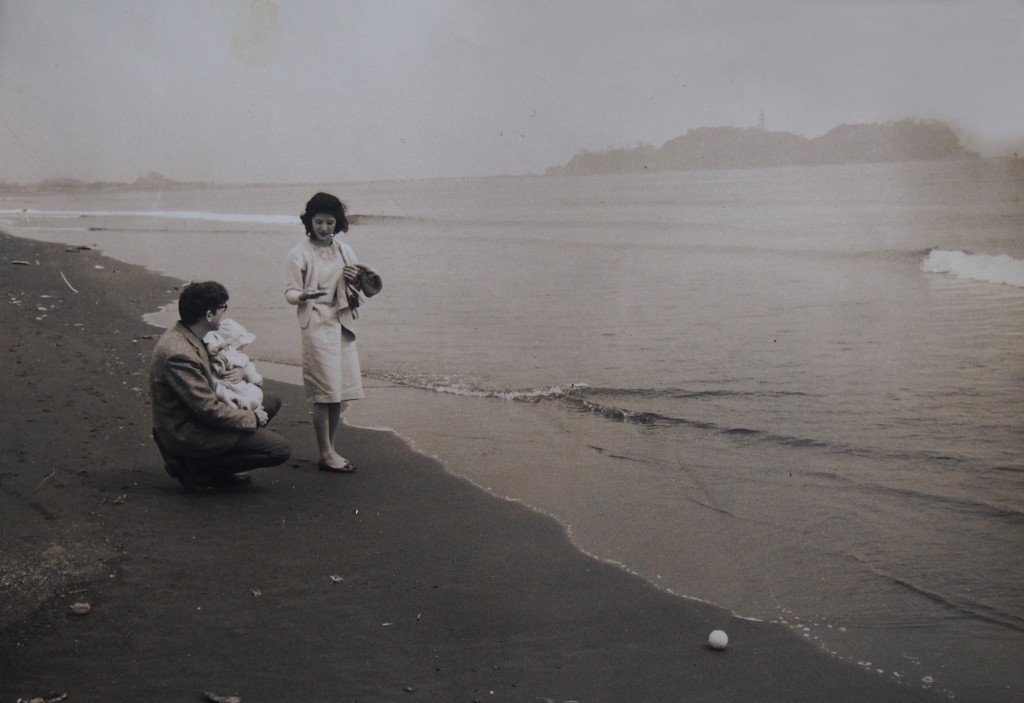
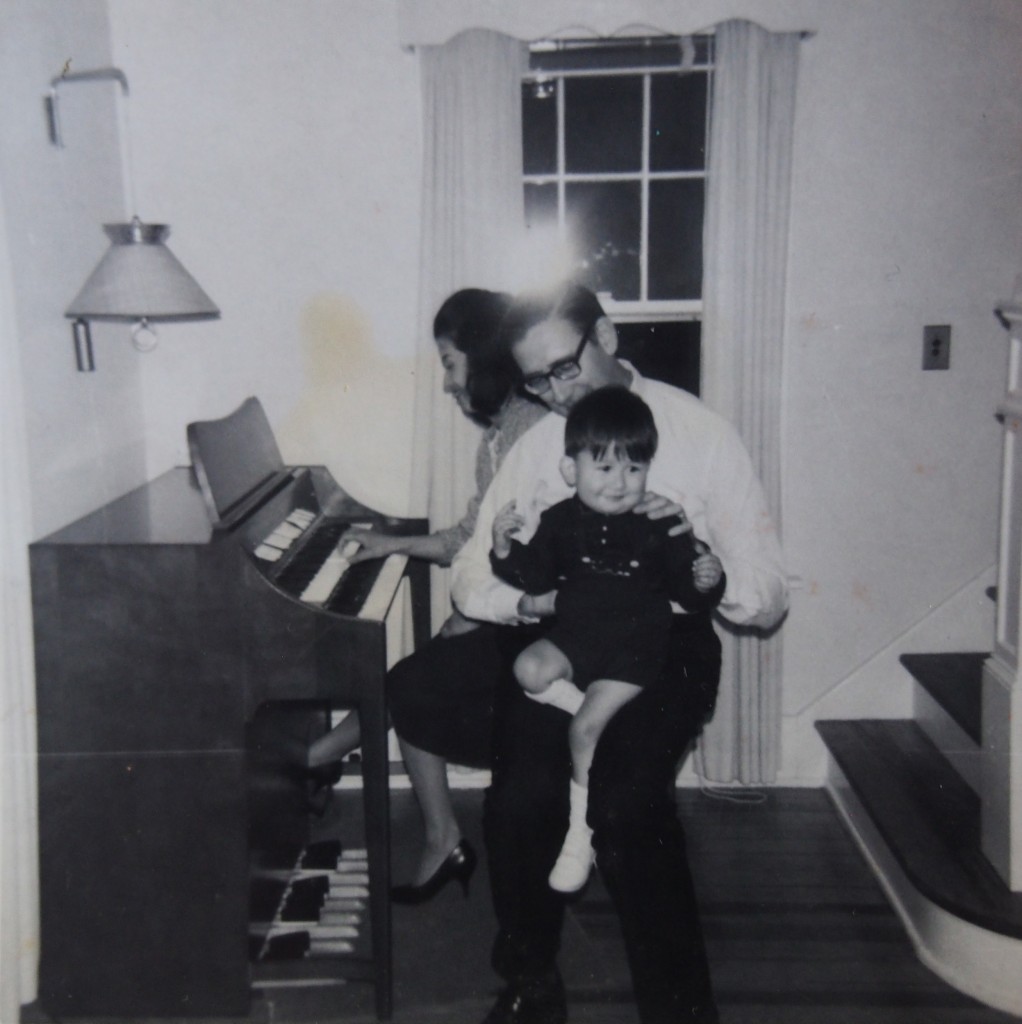
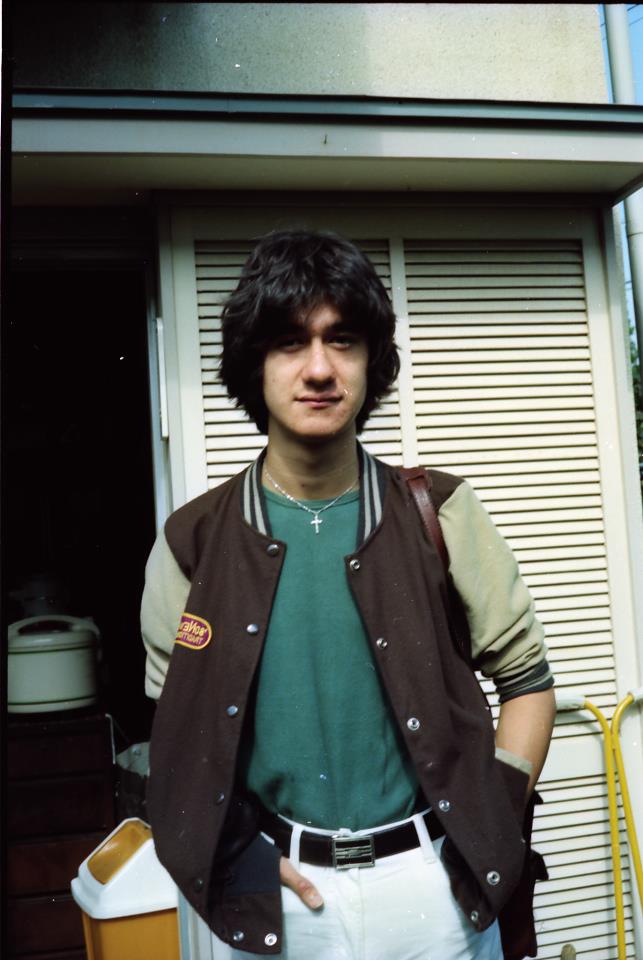
synesthesia (共感覚)。この言葉との出会いは当時オー ティス•パーソンズ美術大学の講師だったローリー•ヘイ コックさんから習ったものでした。彼女は私がアメリカで初めて巡りあった前衛美術とデザインの狭間で活躍している作家で、文学を学んだのちに現代美術・デザインに渡った経歴を持つ、私の中の日本のデザイン思想を覆すものを持っていた恩師です。共感覚は、音それぞれに色が見えるなどある刺激に対して通常の感覚だけでなく、異なる種類の感覚をも生じる 特殊な知覚現象。人間の五感または六感の間で行き交う 音、数、色に対する関係性を導き出すその発想は誰にで もあり、それは個人の体内、脳や心の連動で活性される ものであったり、とにかくその方向の可能性が広がり、私の創作にも大きな影響がありました。そのころ流行っていたダ ブルカセットレコーダーを入手したり、CDプレー ヤー、電子楽器を解体したり、かたっぱしからテレビから出る声をサンプリングしたり、荒々しい刻み音におろしたりと、製作のプロセスは尽きないものでした。
BUNBUNROKU (spoken word log) - Part One
My most important concern while recording a subject’s voice are the sounds and silences potentially emitted by myself as the recording operator. Returning in mid-air, the subject’s response materializes between body language and utterance. Holding my breath, the microphone captures the ever-changing portrayal of the subject’s voice from clustered patterns of noise redrawn over time.
My late father, who passed eight years ago, enjoyed a handful of daily routines. Music was always a favorite. He would begin the morning singing arias as a prelude to playing the “record of the day”, browsing through well-organized shelves and laying that chosen vinyl onto the turntable, warming it up in an expectant ritual. While keeping an eye over the glossy grooves and holding the stylus, he would annotate the art of these classics to my unawake mind- not enough to remember any composers name or any symphonic title. Contrary to my interests, the physical memory retained every note that entered the ear.
After dinner, Dad spent time reading and making diary entries that compiled over 58 years of his life. I am reminded of the great Jerry Gretzinger, an artist who I met through this year’s Aichi Triennale. Jerry continues to build his life-time artwork (53 years in the making) of imaginary places tiled into a larger than life map. This combined spirit of faith, focus and passion reminds me of the benevolent nature of the older American generation. From the perspective of the contemporary multi-gadget owner, we consciously and unconsciously locate the inputs and outputs of things. Gretzinger’s time-line defying attitude seems beyond sublime. As well, my father’s activity of assimilating and archiving text often paralleled that of a temple monk’s.
“When I was very little, my mother painted our living room this dark red. And her friends all thought she was a little crazy to paint a room that color. And she just really liked it. And I had some kind of funny attachment to it because it was our living room. That is probably the first color that I fell in love with…” This excerpt from Jerry Gretzinger’s anecdote of the first color he fell in love with is one of featured spoken words in my sound installation titled “white house.” Conceived for this year’s Aichi Triennale, my work is an orchestration of collected recordings by people that i have met while traveling the different regions of Japan. Each phrase echoed some relativity in color, tone, language and dialect. With added elaborations to the concept, I have asked artists and festival staff members to contribute their thoughts on words and color. While the majority of recordings were made from classic novel excerpts, the overall presentation can be viewed as cinematic vignettes in chorus.
My father was a literature professor at Aoyama Gakuin University. He had a variety of part time work on the side; translator and copywriter at Bridgestone Tires; moderator for a conversational English television show at NHK; and a vocal actor for radio dramas. There was one opportunity when I was invited to play a child’s role on one of his programs. But to his disappointment, I succumbed to stage fright, overwhelmed with fear and wet my pants on stage. This may have cost his reputation. I was much different as a child; escaping crowds, I found refuge in forests and in awe listened to insects, their noise resonated over fallen leaves, winds slipped whistles between twigs and branches of massive trees. The incandescent sun permeated wide into the great sky drawing the shimmering sound closer.
“Foolish reasons are necessary.” One of the wise sayings I’ve inherited from my dad was a Kanji appropriation of our family name Griffith that he and Gakushuin professor Reginald Blyth devised together into a phonetic idiom, adding meaning per syllable; “Gu” “Ri” “Hi” “Su.” That wisdom package didn’t include the skills to sing and I’ve avoided Karaoke hangouts as much as I can. Serving as the antithesis, my younger brother Aaron, thrived in vocal, piano and classical guitar, while typical juvenile anarchist movements lead me to rock, jazz, experimental music and contemporary art, placing myself on a sabbatical from the family. I set out on tangents to meet like-minded artists and experience alternative forms of music. On a full circle of events, I was recently asked to perform vocals for a Fluxus happening. Feeling wrenched, I jumped into the depths blindly and let it happen. This was a reclaiming moment of the “power of voice.”
Synesthesia is a sensation produced in one modality when a stimulus is applied to another modality. For example, when hearing a particular sound induces the visualization of a color. I was first introduced to this phenomena by graphic designer Laurie Haycock when she was professor at Otis Parsons School of Design in Los Angeles. She was the first genre bending artist who destroyed any preconceived ideas about Japanese design supremacy that I held onto. Straddling literature, contemporary art and design, her influences transpired beyond the five senses. I bought myself a portable double cassette recorder to rough edit and mix anything sound that was in reach including TV, radio, street sounds, conversations. Dismantling CD players and electronic instruments uncovered strange noise and the possibilities of processes that became unlimited.
(continues to part two)
記事一覧
-
2020-summer-story
02│8月12日 台湾 -
2020-summer-story
01│8月5日 東京 -
2020-summer-story
00│公開予定 -
町田恵美
01│MAX PLAN 1970-1979 -
港千尋
02│瞬間建築 -
港千尋
01│長い橋 -
関川歩
01│南方以南 the Hidden South -
呂孟恂
00│プロフィール -
町田恵美
00│プロフィール -
関川歩
00│プロフィール -
港千尋
00│プロフィール -
瀬尾夏美
05│ふるさと -
ぬかつくるとこ
05│上木戸工作室 -
辻田美穂子
05│BRIDGE STORY05 -
辻田美穂子
04│BRIDGE STORY04 -
ぬかつくるとこ
04│コイケノオイケ -
瀬尾夏美
04│架空のまち|誰かに旅をしてもらう -
ぬかつくるとこ
03│しょうへいくんのプラバン工場 -
辻田美穂子
03│BRIDGE STORY3 -
瀬尾夏美
03│なくなったまちを訪ねて -
ぬかつくるとこ
02│とだのま -
辻田美穂子
02│BRIDGE STORY02 -
02│掘る形 -
瀬尾夏美
02│山の終戦を訪ねる -
キオ・グリフィス
01│文聞録~其の一 -
辻田美穂子
01│BRIDGE STORY01 -
ぬかつくるとこ
01│「ぬか つくるとこ」とは -
瀬尾夏美
01│陸前高田にて -
01│The Color of Oil -
瀬尾夏美
00│プロフィール -
00│プロフィール -
00│プロフィール -
キオ・グリフィス
00│プロフィール -
辻田美穂子
00│プロフィール -
ぬかつくるとこ
00│プロフィール -
ムーニー・スザンヌ
05│レジリエント・アーティスト -
齋藤彰英
05│《移動すること》構造線と塩の道 ⑤ -
大谷悠
05│現代都市のアジールと「あそび」のクオリティ -
大谷悠
04│都市の「あそび」に集まるひとたち——「日本の家」となかまたち -
舩木翔平
05│新しい日常を創り出すこと -
舩木翔平
04│野菜たちの作り方 -
原亜由美
05│記憶の居場所 -
仲宗根香織
05│小舟で漕いで行く -
太田エマ
04│#IAmaMigrant -
江上賢一郎
05│『流転しつつ根をはること -マレーシア、インドネシアの芸術・文化実践- 』 -
齋藤彰英
04│《移動すること》構造線と塩の道 ④ -
ムーニー・スザンヌ
04│猫の生活:下、上、間、後ろ、向こう -
太田エマ
03│70代以上の女性:どうやって働いてきたのでしょうか? -
江上賢一郎
04│都市の瓦礫から文化をつくる。(韓国) -
仲宗根香織
04│宇宙につながる歴史、光、写真 -
原亜由美
04│リトアニアとハワイ -
大谷悠
03│「公共空間」で「あそぶ」— 小倉城を攻め落とした話 -
ムーニー・スザンヌ
03│都市発展のオルタナティブ・タイムライン -
齋藤彰英
03│《移動すること》構造線と塩の道 ③ -
舩木翔平
03│畑の中の小さなお店から始まる出来事 -
江上賢一郎
03│台南の家族たち -
仲宗根香織
03│傷の想像力 -
原亜由美
03│照らされること -
ムーニー・スザンヌ
02│包含し、守り、分ける、壁 -
齋藤彰英
02│《移動すること》構造線と塩の道 ② -
大谷悠
02│産業遺産を「アート」で「あそぶ」— ドイツの衰退工業都市に「パラダイス」をつくった話 -
舩木翔平
02│街にヤギ -
太田エマ
02│アートとプレカリアート¹ -
原亜由美
02│土地と向き合う -
江上賢一郎
02│Alternative Asia 香港編(後編) -
仲宗根香織
02│生まれ変わる街を想像する力 -
齋藤彰英
01│《移動すること》構造線と塩の道 ① -
大谷悠
01│「空き家」と「あそび」— ライプツィヒ「日本の家」 -
舩木翔平
01│ニュータウンに残された奇跡の農村風景 -
ムーニー・スザンヌ
01│場所から場所へ移動する / As We Travel from Point to Point -
原亜由美
01│夏と記憶の欠片 -
太田エマ
01│パブリックと領域
場所を持つことはパブリックを不可能にするか? -
江上賢一郎
01│Alternative Asia 香港編(前編) -
仲宗根香織
01│秘密のない風景 -
ムーニー・スザンヌ
00│プロフィール -
舩木翔平
00│プロフィール -
大谷悠
00│プロフィール -
齋藤彰英
00│プロフィール -
仲宗根香織
00│プロフィール -
原亜由美
00│プロフィール -
太田エマ
00│プロフィール -
江上賢一郎
00│プロフィール
Warning: array_pop() expects parameter 1 to be array, bool given in /home/users/2/abi0707/web/a-b-i.info/wp/wp-content/themes/abi/sidebar.php on line 19
Warning: array_shift() expects parameter 1 to be array, bool given in /home/users/2/abi0707/web/a-b-i.info/wp/wp-content/themes/abi/sidebar.php on line 22
Warning: array_pop() expects parameter 1 to be array, bool given in /home/users/2/abi0707/web/a-b-i.info/wp/wp-content/themes/abi/sidebar.php on line 19
Warning: array_shift() expects parameter 1 to be array, bool given in /home/users/2/abi0707/web/a-b-i.info/wp/wp-content/themes/abi/sidebar.php on line 22
Warning: array_pop() expects parameter 1 to be array, bool given in /home/users/2/abi0707/web/a-b-i.info/wp/wp-content/themes/abi/sidebar.php on line 19
Warning: array_shift() expects parameter 1 to be array, bool given in /home/users/2/abi0707/web/a-b-i.info/wp/wp-content/themes/abi/sidebar.php on line 22
Warning: array_pop() expects parameter 1 to be array, bool given in /home/users/2/abi0707/web/a-b-i.info/wp/wp-content/themes/abi/sidebar.php on line 19
Warning: array_shift() expects parameter 1 to be array, bool given in /home/users/2/abi0707/web/a-b-i.info/wp/wp-content/themes/abi/sidebar.php on line 22